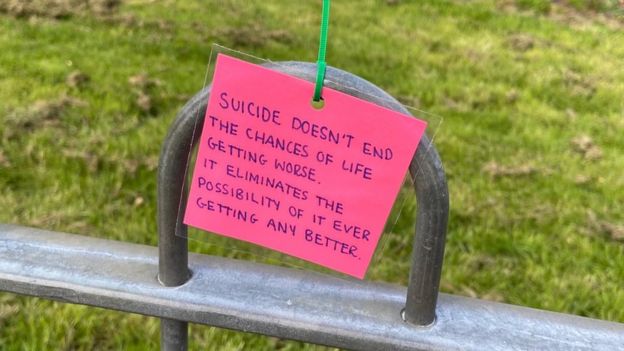James Donaldson notes:
Welcome to the “next chapter” of my life… being a voice and an advocate for mental health awareness and suicide prevention, especially pertaining to our younger generation of students and student-athletes.
Getting men to speak up and reach out for help and assistance is one of my passions. Us men need to not suffer in silence or drown our sorrows in alcohol, hang out at bars and strip joints, or get involved with drug use.
Having gone through a recent bout of depression and suicidal thoughts myself, I realize now, that I can make a huge difference in the lives of so many by sharing my story, and by sharing various resources I come across as I work in this space. http://bit.ly/JamesMentalHealthArticle

by Rachel Ehmke
The teenage years have a lot in common with the terrible twos. During both stages, our kids are doing exciting new things, but they’re also pushing boundaries (and buttons) and throwing tantrums. The major developmental task facing both age groups is also the same: kids must pull away from parents and begin to assert their own independence. No wonder they sometimes act as if they think they’re the center of the universe.
This makes for complicated parenting, especially because teens are beginning to make decisions about things that have real consequence, like school and friends and driving, not to speak of substance use and sex. But they aren’t good at regulating their emotions yet, so teens are prone to taking risks and making impulsive decisions.
This means that having a healthy and trusting parent-child relationship during the teenage years is more important than ever. Staying close isn’t easy, though. Teens often aren’t very gracious when they are rejecting what they perceive to be parental interference. While they’re an open book to their friends, who they talk to constantly via text messages and social media, they might become mute when asked by mom how their day went. A request that seemed reasonable to dad may be received as a grievous outrage.
If this sounds familiar, take a deep breath and remind yourself that your child is going through his terrible teens. It is a phase that will pass, and your job as a parent is still vitally important, only the role may have changed slightly. Here are some tips for navigating the new terrain:
1. Listen. If you are curious about what’s going on in your teen’s life, asking direct questions might not be as effective as simply sitting back and listening. Kids are more likely to be open with their parents if they don’t feel pressured to share information. Remember even an offhand comment about something that happened during the day is her way of reaching out, and you’re likely to hear more if you stay open and interested — but not prying.
2. Validate their feelings. It is often our tendency to try to solve problems for our kids or downplay their disappointments. But saying something like “She wasn’t right for you anyway” after a romantic disappointment can feel dismissive. Instead, show kids that you understand and empathize by reflecting the comment back: “Wow, that does sound difficult.”
3. Show trust. Teens want to be taken seriously, especially by their parents. Look for ways to show that you trust your teen. Asking him for a favor shows that you rely on him. Volunteering a privilege shows that you think he can handle it. Letting your kid know you have faith in him will boost his confidence and make him more likely to rise to the occasion.
4. Don’t be a dictator. You still get to set the rules, but be ready to explain them. While pushing the boundaries is natural for teenagers, hearing your thoughtful explanation about why parties on school nights aren’t allowed will make the rule seem more reasonable.
5. Give praise. Parents tend to praise children more when they are younger, but adolescents need the self-esteem boost just as much. Teenagers might act like they’re too cool to care about what their parents think, but the truth is they still want your approval. Also looking for opportunities to be positive and encouraging is good for the relationship, especially when it is feeling strained.
6. Control your emotions. It’s easy for your temper to flare when your teen is being rude, but don’t respond in kind. Remember that you’re the adult and he is less able to control his emotions or think logically when he’s upset. Count to ten or take some deep breaths before responding. If you’re both too upset to talk, hit pause until you’ve had a chance to calm down.
7. Do things together. Talking isn’t the only way to communicate, and during these years it’s great if you can spend time doing things you both enjoy, whether it’s cooking or hiking or going to the movies, without talking about anything personal. It’s important for kids to know that they can be in proximity to you, and share positive experiences, without having to worry that you will pop intrusive questions or call them on the carpet for something.
8. Share regular meals. Sitting down to eat a meal together as a family is another great way to stay close. Dinner conversations give every member of the family a chance to check in and talk casually about sports or television or politics. Kids who feel comfortable talking to parents about everyday things are likely to be more open when harder things come up, too. One rule: no phones allowed.
9. Be observant. It’s normal for kids to go through some changes as they mature, but pay attention if you notice changes to her mood, behavior, energy level, or appetite. Likewise, take note if he stops wanting to do things that used to make him happy, or if you notice him isolating himself. If you see a change in your teen’s daily ability to function, ask her about it and be supportive (without being judgmental). She may need your help and it could be a sign she needs to talk to a mental health professional.



